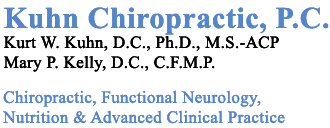Functional Neurology in Waterloo IA

Functional Neurology in Waterloo IA , also called Chiropractic Neurology, uses sensory and cognitive based therapies and activities to improve the function of the brain and nervous system. Functional neurology does not use pharmaceuticals or surgery like medical neurologists. Rather it focuses on using natural methods to retrain and rehabilitate the nervous system.
Chiropractic Neurologist in Waterloo IA
Dr. Kuhn is the area’s only Board-Certified Chiropractic Neurologist who has passed the stringent testing of the American Chiropractic Neurology Board. He has also passed the subspecialty certification in Electrodiagnostics giving him the expertise to work with advanced technologies for brain-based and peripheral nerve concerns. He earned his Fellow status through the American College of Functional Neurology and the American Board of Electrodiagnostic Specialties.
His PhD work was instrumental in demonstrating how functional neurology methods can be used to address and overcome developmental concerns like ADD, ADHD, OCD and Tourette Syndrome. His work has been published in prestigious professional journal The Journal of Chiropractic Medicine and has been referenced by other journal articles and researchers.
Common conditions addressed by functional neurologists are concussions, ADHD, OCD, Tourette's syndrome, Asperger syndrome, dyslexia, dyscalculia and other learning difficulties, fatigue, central vertigo, memory problems, migraines, and neuropathies. We provide a variety of diagnostic testing and care including:
Advanced Diagnostics including:
- EEG
- QEEG
- NCV
- EMG
- BAER
- VEP
- And other methods to help find the underlying cause of your health concern.
Chiropractic Neurology
- Neurofeedback (EEG Biofeedback): Powerful tool for brain training and rehabilitation from developmental concerns, PTSD, concussion, and well as concerns.
- Interactive Metronome: Helps develop timing, balance, and coordination in both the brain and body.
- Neuromuscular Re-education: A variety of exercises done one on one with the doctor to train your nervous system.
- Optokinetic and Other Eye Training: Your eyes and brain work together. The parts of the brain used in eye movement are involved in more than just the movement but also cognition, balance, and other important health functions.
- Insufflation: Fast immediate relief from migraine pain using gentle little puffs of air into your ear via an otoscope bulb. Pain-free relief from tough migraines.
- Tone Bursts: for relief from chronic pain and sympathetic dystrophies
- Trans Cranial Electrical Stimulation: A powerful method to calm down the brain and lower sympathetic (fight or flight) responses. Very useful for anxiety and other concerns.
- Vestibular Stimulation: A variety of methods to provide relief for dizziness, vertigo, and other vestibular conditions.
- And many other rehabilitative activities: We have a variety of methods that you can do under our supervision as well as at home.
Resources on Care for Developmental, Learning & Behavioral Conditions
Help for the underlying cause of AD/HD, OCD, Tourette syndrome, Asperger syndrome, Autism, Dyslexia, Learning Difficulties, Fatigue, Memory Problems, and Migraines. We put the puzzle of brain-based care together for you!
Brain-based and Evidence-Based Care for your child's learning and Behavioral needs: We don't just say we can help, we document it. Follow the links tiered to this page and you will find study after study in peer-reviewed scientific literature demonstrating that the tools we use are effective.
Dr. Kuhn's work is also published in peer-reviewed scientific publications. His 2005 Dissertation entitled "An Assessment of Carrick's Brain-Based Mode of Care in the Treatment of Functional Disconnection Syndrome: A Case Study" was one of the first published describing this type of care applied to developmental, learning, and behavioral disorders. His article published in the Journal of Chiropractic Medicine in December 2013 also demonstrated the effectiveness of his care.
We don't just rely on past research. We also document our care along the way. That way we can make adjustments in the care plan as needed to optimize progress and outcomes and tune our care to your loved ones specific needs.
A New Way of Looking at Conditions: Most doctors diagnose developmental and behavioral disorders based on their symptoms. The problem with this is that many different regions of the brain can cause the same symptoms. Another problem is the tendency to use treatments that cover the symptom and leave the problem to continue to worsen over time. We don't do that.
We diagnose and treat the brain and the rest of the nervous system functionally. We localize where in the brain or nervous system that function is being lost and rehabilitate it towards normal function. Follow these links to find out how others have been helped with Dr. Kuhn's care:
An assessment of Carrick's brain-based model of care in the treatment of functional disconnection syndrome
Functional disconnections and disconnections: Functional disconnection implies an interrupted circuit. Examples of this would include damage done to the brain during its development during the "pruning process." We are born with twice the number of brain cells that we need. This allows us to adapt to nearly any environment that we may be born into.
Somewhere around ages 18 months to 2.5 years our brain "prunes" and gets rid of unnecessary wiring so that our brain can function more efficiently. Unfortunately, if there is inflammation present during this time the body may read this and prune valuable wiring too, even if it is being used. This can create functional disconnections as it literally disconnects by damaging the connections within the circuits.
Functional disconnections are too much or too little function between two or more locations and can be evaluated via a variety of different measurements such as amplitude asymmetry, coherence, or phase lag. These concepts are measured by Quantitative Electroencelphalography or QEEG. These are discussed more fully on our QEEG page under functional neurology services.
Because brain science can get complicated very fast we sometimes simplify our descriptions to labels that describe the predominant area of involvement. Sometimes we use the description hemisphericity to describe which side of the brain is functioning lower relative to the other side.
Left Brain or Right Brain Dominant Conditions: Brain-based conditions are often simplified in their description as spectrums relating to the side of the brain that is most involved. For example:
The Right-Brain Spectrum: ADD, ADHD, OCD, Tourette syndrome, Asperger Syndrome, Autism
The Left-Brain Spectrum: Dyslexia, Learning Difficulties, Fatigue, Memory Problems, Depression, Migraines
While these simplifications are useful, it is important to understand that the nervous system is a system of systems and is much more complicated than just left or right brain concerns and there are individual differences that may vary from these generalizations. The brain has modules of function and our specialty is diagnosing which parts are low functioning and selecting the right tools for rehabilitating them back up normal. We look forward to helping you and your loved ones with their developmental or behavioral concerns!
OFFICE HOURS
Monday
9:00am - 12:00pm
3:00pm - 5:30pm
Tuesday
9:00am - 12:00pm
3:00pm - 5:30pm
Wednesday
9:00am - 12:00pm
3:00pm - 5:30pm
Thursday
9:00am - 12:00pm
3:00pm - 5:30pm
Friday
Closed
Saturday & Sunday
Closed
Kuhn Chiropractic PC
3602 Kimball Ave
Waterloo, IA 50702


